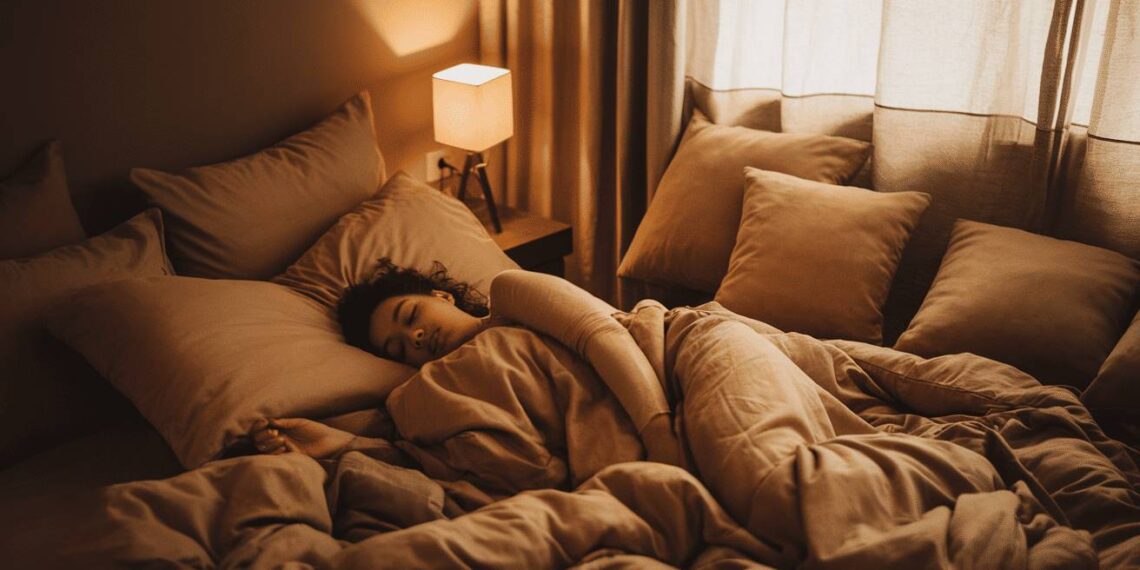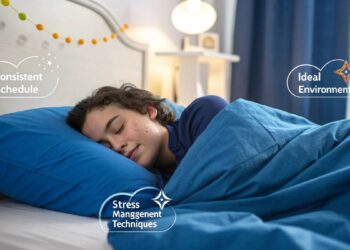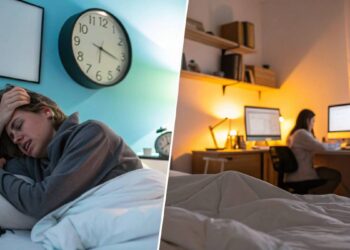Sleep is more than just a daily ritual—it’s the foundation of our mental, emotional, and physical health. Yet, so many of us push sleep aside for our busy lives, causing a ripple effect on productivity and well-being. Are you waking up groggy or struggling to focus? It’s time to prioritize your sleep and build habits that allow you to wake up feeling truly refreshed. From crafting a soothing nighttime routine to creating a sleep-friendly bedroom environment, these practical and research-backed tips will transform how you approach rest, ensuring you enjoy better health and happiness.
Key Takeaways
- Why Sleep Matters: Vital for emotional stability, physical health, and memory, quality sleep impacts every area of life.
- Consequences of Sleep Deprivation: Poor sleep is linked to weakened immunity, weight gain, diabetes, and heart issues, as well as emotional challenges like anxiety and depression.
- Establishing a Sleep Schedule: A consistent sleep and wake schedule enhances your body’s internal clock and improves both quality and quantity of sleep.
- Ideal Sleep Environment: Proper temperature, soundproofing, and blackout curtains can significantly improve sleep quality.
- Relaxing Bedtime Routine: Techniques like muscle relaxation, meditation, and avoiding stimulants aid in preparing your mind and body for rest.
- Exercise and Stress Management: Physical activity promotes deep sleep, while stress-relieving exercises like journaling and mindfulness enhance relaxation.
- Sleep Monitoring Tools: Tracking your sleep patterns through apps or diaries can uncover habits that improve or hinders sleep quality.
Why Sleep Matters More Than We Think
Getting a solid night of sleep is more than just a luxury—it’s a key player in feeling good and living well. Grasping why sleep is so important can help folks give rest the spotlight it deserves and nail down your sleep game with some useful tips.
What Lack of Sleep Does to You
Not catching enough Z’s can mess with you in quite a few ways. Missing out on good sleep is tied to all sorts of health troubles. Skipping sleep can take a toll on your body’s defense system, leaving you open to colds and infections. It’s not just about feeling groggy—those who don’t sleep enough can end up facing long-term issues like weight gain, sugar spikes, and heart troubles.
| Health Problem | What Sleep Deprivation Does |
|---|---|
| Immune Defenses | Makes you more likely to catch bugs |
| Your Mind | Bumps up anxiety and depression |
| Heart Health | Cranks up the chance of heart issues |
| Metabolism | Adds to the risk of weight and sugar problems |
If you want to dig deeper into how missing sleep messes with you, check out our full scoop on how to improve sleep quality.
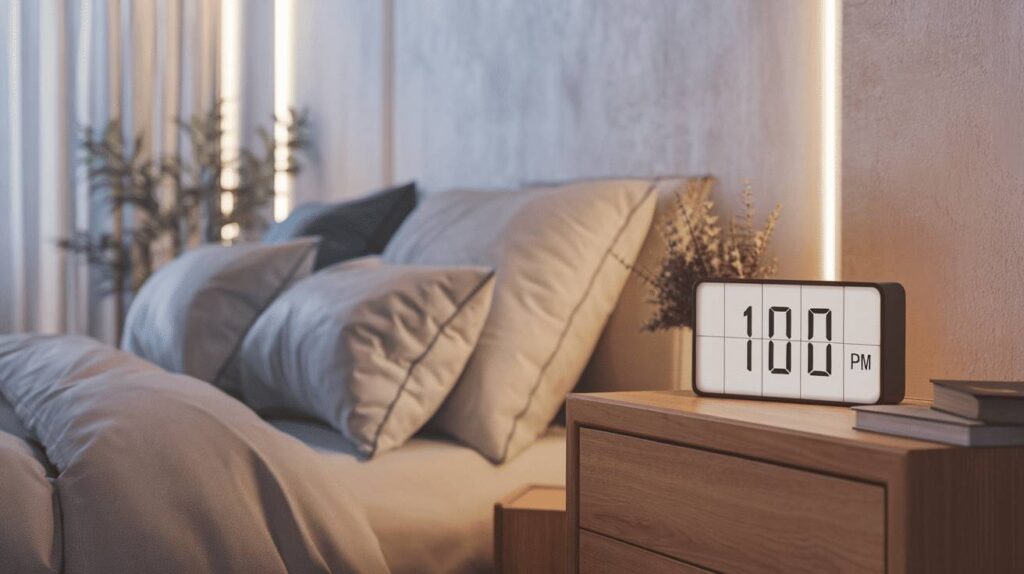
Why a Sleep Schedule Rocks
Sticking to a sleep schedule brings heaps of upsides. Quality sleep is like hitting a reset button for your body and brain. It pumps up your brainpower, so you can remember stuff, learn new things, and solve problems like a champ. Plus, sound sleep is your secret weapon against daily stressors, helping you keep your cool when life throws curveballs.
| Why It’s Worth It | Perks of Good Sleep Habits |
|---|---|
| Brain Boosters | Sharper memory and better solving skills |
| Emotional Cheers | Smooth sailing in stress and mood storms |
| Body Benefits | Stronger defenses and more get-up-and-go |
If you’re curious to know more about why keeping a solid sleep routine is a win, check out our guide on tips for better sleep.
“Consistency is key. Sleep loves a routine, and so does your body’s internal clock.” – Dr. Katy James, Chartered Psychologist
By catching on to why sleep is such a big deal, it’s easier to make those needed lifestyle changes for better sleep and dive into sleep improvement techniques that’ll set you up for feeling great and doing well.
Creating a Sleep-Inducing Environment
Picture this: every night, you find yourself tossing and turning, all because your room’s vibe ain’t right for sleep. But turn certain things around, and you’ll be snoozing like a baby.
Setting the Right Temperature
Let’s talk temp. Do you sleep like an ice cube or a cozy burrito? A sweet spot for dozing off sits between 60°F to 67°F (15°C to 19°C). Keep your room a little on the chilly side, and your body will naturally drift to dreamland.
| Temp (°F) | Temp (°C) | Sleep Vibes |
|---|---|---|
| 60 – 67 | 15 – 19 | Prime snoozing |
| 68 – 72 | 20 – 22 | Eh, it’s okay |
| 73+ | 23+ | Yikes! Hot mess |
Got a warm room? Crank up a fan, switch on the AC, or just nudge that thermostat down a notch. More no-sweat sleep tips await on improving sleep habits.
Eliminating Noise and Light Disturbances
Noises and light buzzing around can ruin a perfect night’s rest. Tweak your sleep zone with these hacks:
- Noise:
- Earplugs or a white noise machine can be lifesavers.
- Heavy curtains or a plush rug can soak up those pesky sounds.
- Light:
- Blackout curtains are your best friends to block outside lights.
- An eye mask’s your hero if total darkness isn’t your thing.
- Dimming lights an hour before bed can whisper, “hey, it’s chill time.”
Need more peace-promoting pointers? Hit up our sleep optimization tips.
Choosing Comfortable Bedding
Snazzy bedding can do wonders. Nail the mattress, the pillows, and those soft sheets—they’re your cozy allies:
- Mattress: Whether you’re on your back, side, or stomach, get a mattress that helps you out.
- Pillows: Pick pillows that match your neck and spine’s dance.
- Bedding: Dive into breathable, snuggly sheets made of cotton or bamboo.
| Bedding Item | Comfort Level | Materials |
|---|---|---|
| Mattress | Firm support | Memory Foam, Innerspring |
| Pillows | Happy Neck | Latex, Feather |
| Sheets | Cool Breezy | Cotton, Bamboo |
With these sleep-better hacks, you’re on your way to a cozy, sleep-friendly zone. Wanna explore more tricks for catching Zs? Check our all-encompassing guide on effective sleep improvement strategies.
Establishing a Relaxing Bedtime Routine
Let’s be real, everyone loves a good night’s sleep, right? Crafting a smooth, calming nighttime routine can be a game-changer. Check out these tips that’ll have you snoozing like a champ.

Relaxation Techniques Before Bed
Relaxation before hitting the hay is the key to drifting off peacefully. These tips chill your brain and body, setting the stage for dreamland.
- Deep Breathing: Taking slow, deep breaths can zap stress away.
- Progressive Muscle Relaxation: Tighten up those muscles, then sit back as you release and untangle that tension.
- Reading: Dive into a paperback; it’s a light remedy that’s so much better than staring at screens.
- Listening to Soothing Music: Nature sounds or easygoing tunes can set the vibe just right.
- Journaling: Jotting down thoughts can clear your head and tone down that pre-bed worry.
Curious for more? Peek at our article on chilling out before sleep.
Avoiding Stimulants and Heavy Meals Close to Bedtime
Watch what you munch and guzzle as bedtime draws near. Skipping heavy grub and stimulants is your ticket to dreamville.
| Time Before Bed | Stimulant to Avoid | Why? |
|---|---|---|
| 4-6 hours | Caffeine | It cranks up alertness, messing with sleep |
| 2-3 hours | Nicotine | It’s like hitting the snooze button on sleep |
| 2-3 hours | Heavy Meals | Can stir up indigestion, making sleep elusive |
Instead of a feast, go for a bite – like a banana or some yogurt – to keep that belly in check. Discover more at our food tips for better sleep.
Consistent Bedtime and Wake-Up Times
Sticking to a regular sleep routine helps your internal clock tick smoothly. Crash and rise at the same time daily, and you’re bound to feel more refreshed when the alarm rings.
| Activity | Ideal Time |
|---|---|
| Bedtime | Between 10:00 PM – 11:00 PM |
| Wake-Up Time | Between 6:00 AM – 7:00 AM |
A set routine aligns your body’s clock, giving serious boosts to sleep quality. For more on this, swing by our article on how to nail that perfect sleep schedule.
Take these nuggets of advice and sprinkle ’em into your routine. Test a few out and see what gets you the best shut-eye. For more ideas, wander through our bag of sleep tricks.
Incorporating Physical Activity into Your Day
Throwing some physical activity into your daily mix isn’t just about getting fit; it’s your ticket to better sleep! When you lace up those sneakers and get moving, you’re set for nights of dreamy, blissful slumber.

Benefits of Exercise on Sleep Quality
Getting some exercise isn’t just good for the soul—it’s a slumber booster too! Regular movement helps sync up your body’s internal clock and gives you more of that deep, knock-you-out kind of sleep we all crave.
| Move Your Body | Sleep Better |
|---|---|
| Goodbye Insomnia | Less tossing and turning |
| Quicker Z’s | Drift off faster |
| Longer Sleep | More snooze time |
| Dreamland Quality | Deep sleep delight |
Make exercise your best bud, and you’ll kiss goodbye those nighttime wake-ups and hug a more regular sleep pattern. Hungry for more sleep tips? Take a peek at how to catch more Z’s.
Finding the Right Exercise Routine
Not all workouts are created equal, especially when sleep is your goal. It’s all about the right type, strength, and timing to fit into your story.
- Find Your Fit:
- Cardio Fun: Go for a walk, jog, cut a few laps in the pool, or pedal around the block.
- Build Some Muscle: Pump iron, get into resistance bands, or just use your body’s weight.
- Stay Flexible: Dive into yoga, Pilates, or some good old-fashioned stretching.
- Work It Hard, But Not Too Hard:
- Moderate Moves: Clock in 150 minutes a week to see snooze rewards.
- All Out: A 75-minute blitz each week can work wonders for sleep quality.
| Effort Level | Time Investment | Weekly Game Plan |
|---|---|---|
| Go Medium | 30 min/day | 5 days |
| Go Hard | 25 min/day | 3 days |
- Time it Right:
- Best bet? Get active 3-4 hours before hitting the hay. It gives your system time to chill out and makes falling asleep easier.
- Follow What You Fancy:
- Stick to what you love so you’ll keep it up!
Want some exercise ideas that’ll have you snoozing like a champ? Check our piece on lifestyle tweaks for better sleep.
Getting the right moves in your day can turn your nights into dreamy adventures. So why not explore more ways to snooze naturally at natural ways to boost your sleep?
Managing Stress and Anxiety
Stress and anxiety can turn a good night’s sleep into a distant dream. Figuring out how to handle these pesky emotions is key to catching some quality shut-eye.
“A calm mind is a restful mind. Stress reduction techniques can transform the way you sleep.” – Dr. Chelsea Jackson Roberts
How to Stress Less and Sleep More
Here are a few tricks that’ll help kick stress to the curb and invite sweet dreams. These methods will have you snoozing like a baby in no time.
- Deep Breathing Exercises: Inhale and exhale like you’re playing a slow-motion game of tag with your breath. Slowing down your breaths helps hit pause on that racing heart and chills you out.
- Progressive Muscle Relaxation: Get your groove on by tightening and then letting go of your muscles. It’s like giving your body a mini-vacation from all the stress.
- Journaling: Letting your thoughts spill onto paper before you hit the hay can work wonders. It’s like talking to a friend who just listens, helping you empty your mind and sleep more soundly.
Tune In to Mindfulness and Meditation
Adding a bit of mindfulness and meditation to your daily to-do list can seriously upgrade your bedtime routine. Plus, it helps you live more in the now.
- Mindfulness Meditation: Focus on your breath as if it’s the most interesting thing on Earth. This practice tunes out stress and tunes in a better night’s sleep.
- Guided Imagery: Pop on a guided imagery track and let soothing scenes play out in your mind. It’s like a vacation in your head that helps you drift off.
- Body Scan Meditation: Picture scanning your body for tension, and then watch it melt away. This method helps you hit the off button on stress before you say goodnight.
If you’re itching for more tricks about sleeping better, check out our other reads: sleep improvement techniques, natural sleep enhancement tips, and strategies for enhancing sleep.
By weaving these stress-busting and mindfulness habits into their routine, folks can pave the way to sweeter dreams and better health overall.
Boosting Your Sleep Game
Getting better Z’s isn’t rocket science. Let’s chat about two no-brainer moves: keep your snooze room dark and quiet, and zap that screen time before bed.
Why a Sleep Cave is Your Best Bet
Making your bedroom a blackout zone with peace and quiet can totally up your sleep game. Light and noise are like gremlins that mess with your dreams. You’ll want your space to be a dreamy den with zero interruptions for primo shut-eye.
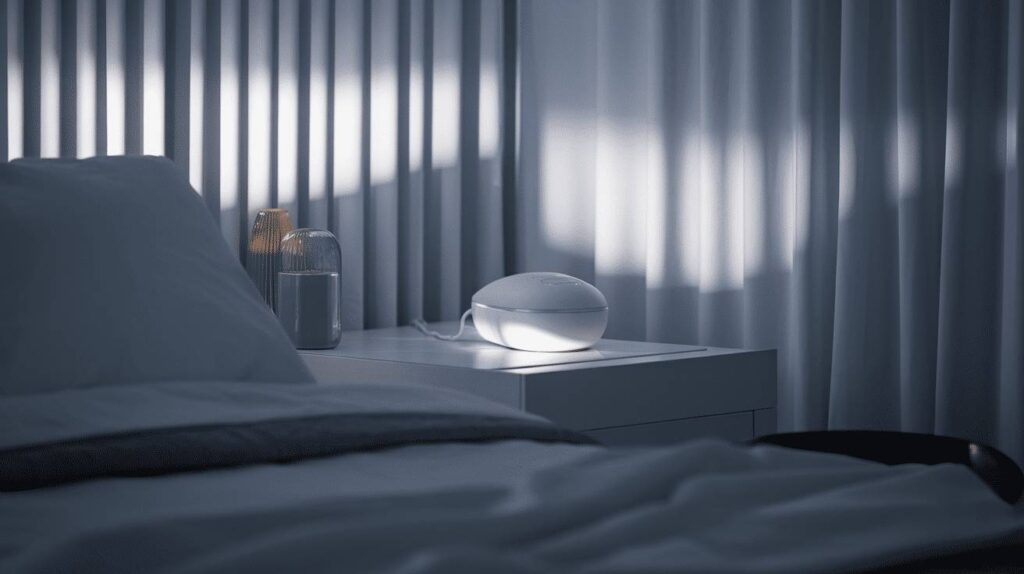
- Lights Out
Your brain’s sleep juice (melatonin) hates light, especially the blue stuff from gadgets. So, kill the lights to tell your body, “Hey, it’s time for lights out!”
| Light Source | What It Does to Sleep Juice |
|---|---|
| Sunlight | Blocks it big time |
| LED lights | Messes with it a bit |
| Total darkness | Lets it flow freely |
If you wanna dive deeper on snoozing smart, peek at our piece on sleep-boosting hacks.
- Silencing the Snooze Zone
Little sounds, even if they’re quiet as a mouse, can trip up your sleep flow. Think about sound-proofing your pad or investing in a white noise doodad to keep it nice and chill.
Cut the Cord on Screen Time Pre-Sleep
Glued to screens before bed? You’re not alone, but heads up – it’s not great for your sleep vibes. Screens scream blue light, which can mess with that sleep juice and your body’s internal snooze clock.
How Screens Squash Sleep
| Screen Action | How It Wrecks Your Sleep |
|---|---|
| Using screens 1-2 hours before bed | Gently bothers sleep |
| Less than an hour pre-sleep | Messes with dreams more |
| In your face at bedtime | Shakes up your snooze bad |
Hack for better sleep: ditch the devices an hour before hitting the sack. Grab a good book or do some chill relaxation moves instead.
For more sleep secrets, check out our snooze-smart guide.
By blacking out your room and cutting screen time pre-bed, you’re on the fast track to awesome sleep. For the full deets on snooze success, hop over to our sleep tips treasure trove.
When It’s Time to Call the Pros
Sure, a solid night’s sleep can be achieved with some clever tricks and lifestyle tweaks, but there are times when expert help is the way to go. Spotting when to reach out to a doctor or specialist can make all the difference in how you feel day to day.
Do You Need a Sleep Doctor?
Here are a few hints that a chat with a sleep pro might be in order:
- Chronic Insomnia: Tossing and turning for weeks? If counting sheep isn’t cutting it after a month, it could be chronic insomnia.
- Daytime Fatigue: Feeling exhausted all the time, even after some solid shuteye? It shouldn’t be cramping your style.
- Sleep Apnea Clues: Loud snoring, gasping, or waking up a bunch? It might be more than just a noisy night.
- Restless Leg Syndrome: A restless urge to move your legs with odd sensations can be a sign.
- Narcolepsy Symptoms: Sudden bouts of sleep or muscle weakness during the day are red flags.
- Mental Health Matters: If issues like depression or anxiety are messing with your sleep, it’s time for a professional opinion.
| Symptom | What’s Happening | Time to Act |
|---|---|---|
| Chronic Insomnia | Can’t sleep for a month or more | Talk to your doctor |
| Daytime Fatigue | Always tired, even with enough Zzzs | If you’re dragging daily |
| Sleep Apnea Clues | Snoring like a freight train, gasping for air | Frequent night disruptions |
| Restless Leg Syndrome | Legs itching to move, weird sensations | If it’s sticking around |
| Narcolepsy Symptoms | Muscles giving out, spontaneous naps | Surprise snoozes |
| Mental Health Issues | Mood struggles hitting sleep | When sleep’s getting tough |
What Happens at the Doctor’s Office?
Once you’ve decided to see a doctor, here’s what they might suggest:
- Sleep Studies: Fancy name for watching how you sleep to figure out what’s up.
- Therapy That Works (CBT): Especially CBT-I aimed squarely at sleep troubles, helping you change those sabotaging thoughts and habits.
- Medications: There might be some meds on the table to help you catch those Zzzs.
- Specialist Visits: Sometimes a deep dive with a neurologist, psychiatrist, or sleep doc is needed.
Make sure to spill the beans about everything you’re feeling, including any other health stuff, when you see your provider. For more bedtime advice, check out links to our helpful reads on ways to snooze better, sleep hygiene habits, and cool tricks for better sleep.
Occasional nature-loving remedies and life tweaks can also be part of the fix. Peek at ideas on natural snooze helpers and life hacks for killer sleep.
Feeling stuck? Getting the right help can really turn your sleep around, helping you grab some solid Zzzs and bounce back to your usual self.
Tracking and Monitoring Your Sleep
Paying attention to how you snooze is pretty clutch if you want those good z’s. By keeping tabs on your sleep, you can spot problems and tweak daily routines to hit that sweet dreamland.
Keeping a Sleep Diary
Think of a sleep diary as your backstage pass to understand what’s wrecking your beauty sleep. Jotting down sleep patterns and things messing with your forty winks can shine a light on habits needing a U-turn.
Here’s the scoop on what usually lands in a sleep diary:
- When you hit the hay and when you rise and shine
- Those wake-up calls in the middle of the night
- How long and well you slept
- What you did before bed
- How you feel in the morning
| Date | Bedtime | Wake-Up Time | Awakenings | Sleep Duration | Sleep Quality (1-5) | Pre-Sleep Activities | Morning Mood |
|---|---|---|---|---|---|---|---|
| 10/01 | 10:00 PM | 6:00 AM | 1 | 8 hrs | 4 | Reading | Relaxed |
| 10/02 | 11:30 PM | 7:00 AM | 3 | 7.5 hrs | 2 | Watching TV | Tired |
| 10/03 | 10:15 PM | 6:15 AM | 2 | 8 hrs | 3 | Meditating | Refreshed |
With a sleep diary, those patterns and culprits like stress or too much smartphone time become clear. Wanna dive deeper into revamping your shut-eye routine? Check out our sleep hygiene tips.
Using Sleep Tracking Apps
For the gadget lovers, sleep apps bring in the tech magic. These apps act like sleep detectives. Using sensors and some brainy stuff, they dissect your snooze time and whip up detailed reports with all the bells and whistles, like:
- Tracking hours and how well you snooze
- Studying sleep stages (light, deep, and dream realm)
- Picking up on snoring and tossing-around moments
- Offering personalized pep talks for better sleep antics
| Feature | Description |
|---|---|
| Sleep Duration | Total hours you’re catching z’s each night |
| Sleep Efficiency | Ratio of actual sleep time versus bed time |
| Sleep Cycles | Time-split across different sleep stages |
| Snoring Detection | Keeps an ear on those snore symphonies |
| Movement Detection | Gauges restlessness during slumber |
| Suggested Improvements | Handy advice based on your snooze history |
Using an app can spill the tea on how you’re actually sleeping and dish out advice for tweaking sleep quality. For even more tricks, swing by our sleep improvement tips.
Whether keeping a diary or going techie with apps, both routes help in spotting the pitfalls in your sleep journey and swapping out habits for sleep bliss. Want to max out your snooze game? Our sleep optimization advice article’s got more for you.
Main Tips
- Maintain a consistent sleep schedule.
- Avoid stimulants and heavy foods 3 hours before bed.
- Moderate physical activity improves rest; avoid late night intense exercise.
- Reduce screen time an hour before bedtime to increase melatonin production.
- Create a relaxing pre-bed routine, such as journaling or sipping herbal tea.
Conclusion
Sleep is the ultimate self-care tool, yet it’s often the first to be sacrificed. Neglect can lead to serious physical and mental health complications, from poor immunity to heightened stress levels. The article laid out clear steps for better sleep: stick to a consistent sleep schedule, design a sleep-inducing environment, incorporate calming routines, and nourish sleep quality with exercise and monitoring tools. Even simple changes, like adjusting room temperature or reducing blue light exposure, can lead to dramatic improvements. Remember, sleep isn’t a luxury—it’s a necessity for peak performance and happiness. It’s time to take charge of your nights to live your best days.
FAQ
What temperature is ideal for a good night’s sleep?
The ideal room temperature for optimal sleep is between 60°F and 67°F (15°C to 19°C). A cooler room aids the body in achieving a restful state.
How does a consistent bedtime improve sleep quality?
Sticking to a sleep schedule trains your body’s circadian rhythm, making it easier to fall asleep and wake up at the desired times.
Why are devices harmful before bedtime?
Devices emit blue light, which interferes with melatonin production and delays the onset of sleep. Avoid screen time at least one hour before bed.
What relaxation techniques work best before bed?
Deep breathing, progressive muscle relaxation, and listening to calming music relax your mind and body, preparing you for sleep.
Is exercise beneficial for sleep?
Moderate physical activity during the day can help you fall asleep faster and deepen your rest. However, avoid high-intensity workouts close to bedtime.
Resources
- National Sleep Foundation: How Much Sleep Do Adults Need?
- CDC on Sleep Health: Why Sleep Matters
- Harvard Health: Tips for Better Sleep
Final Thoughts
Sleep improvement isn’t just about sleeping more but sleeping better. By following these simple steps—establishing consistent routines, managing stress, and optimizing your sleeping space—anyone can unlock the life-changing benefits of quality rest. Remember, sleep is a cornerstone of health, impacting immunity, mood, and even productivity. Start small: invest in blackout curtains, avoid late-night caffeine, or take up deep breathing exercises. As your nights improve, so will your days—making sleep the best investment you can make in yourself.
Recommended Products
- Blackout Curtains: Thermal Insulated Blackout Panels
- White Noise Machine: LectroFan High Fidelity White Noise Machine
- Cooling Mattress: Casper Sleep Original Mattress
- Sleep Tracker: Fitbit Inspire 3 Health Tracker
- Breathable Sheets: Bamboo Sheet Set

